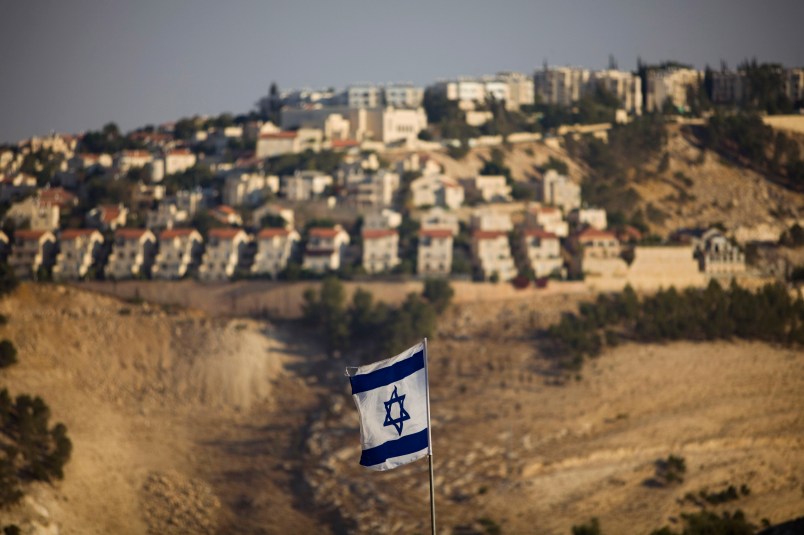JERUSALEM (AP) — Israel’s housing ministry said Thursday it was advancing plans for nearly 1,500 new settlement housing units in the West Bank and east Jerusalem in response to the formation of a Palestinian unity government backed by the Islamic militant group Hamas.
Housing Minister Uri Ariel said in a statement that the move was a “fitting Zionist response to the formation of a Palestinian terror government,” adding that the housing plans were “just the beginning.”
Tenders were issued late Wednesday for about 900 housing units in the West Bank and about 560 units in east Jerusalem, territories that Israel captured in the 1967 war and which the Palestinians claim for their future state. The tenders represent the final governmental approval before construction can begin.
Chief Palestinian peace negotiator Saeb Erekat said the settlement announcement is “a clear sign that Israel is moving toward a major escalation” and that the Palestinians were weighing their response to the announcement. The Palestinians have long viewed settlement construction on land they want for their future state as a major obstacle to resolving the decades-old conflict.
The announcement of new settlement building was the first such move since the official end of nine months of U.S.-mediated Israeli-Palestinian peace talks in April. U.S. Ambassador to Israel Dan Shapiro told Army Radio Thursday that the U.S. opposes the planned settlement construction.
Justice Minister Tzipi Livni, who was Israel’s chief negotiator in the last round of peace talks, told Army Radio the announcement was a “political mistake… that will only distance us from the ability to recruit the world against Hamas.” The international community considers settlements illegal or illegitimate.
Lior Amichai, of the Israeli settlement watchdog Peace Now, also condemned the announcement, saying: “It shows the government’s policy is moving us toward one state.”
As the latest round of peace talks ended with few if any visible signs of progress, rival Palestinian factions Hamas and Fatah moved to end their seven-year rift. The two groups last week agreed to a new unity government comprised of independent technocrats but backed by both movements.
Israel had vowed to take action in response to the new Palestinian unity government because it is supported by Hamas, which is pledged to the destruction of the Jewish state and has carried out scores of deadly attacks against Israelis since it was founded in the late 1980s.
The Construction and Housing Ministry announcement said the settlement tenders were “part of the reaction efforts” to the new Palestinian government.
Israel has urged the West to also shun the new government, but the U.S. and the European Union have said they would work with it. Secretary of State John Kerry defended the decision during a visit to Lebanon on Wednesday, saying none of the ministers has ties to Hamas.
Hamas has been blacklisted as a terror group by the West, while Fatah is led by the Western-backed Palestinian President Mahmoud Abbas. Long-running tensions between the two groups boiled over in 2007, when Hamas seized control of the Gaza Strip, effectively confining Abbas’s security forces to the West Bank.
Police in Gaza shut down banks in the coastal territory Thursday after Hamas-affiliated public servants and security officers rioted at cash machines the previous night because they did not receive their salaries, while Fatah loyalists did.
The new Palestinian government faces many challenges, including blending two large bureaucracies. Abbas’ Palestinian Authority has some 150,000 people on its payroll, including tens of thousands in Gaza who have stayed home from their jobs since 2007. Hamas, meanwhile, had hired more than 40,000 people for its own administration.







Israel is not interested in peace and it is time we faced that fact and stopped making believe that they are. And we really need to stop believing they are our allies.
“…using the formation of a Palestinian unity government backed by the Islamic militant group Hamas as a cynical, but convenient, excuse.”
FIFY
Yo, Obama. It’s cojones time.
I’ve never understood the reasoning behind the notion that Israel is “our friend and ally.”
Is it because their soldiers have stood shoulder-to-shoulder with ours in military conflicts? Well, no, since they never have.
Is it because they allow us to maintain bases on their territory, in the heart of a volatile region? Well, no, since they don’t.
Is it because they allow us to fly over their territory on our way to other hotspots? Well, no, since they don’t.
Is it because they’re supplying us with raw materials or manufactured goods that are vital to our nation security? Well, no, since they don’t.
Is it because they’re a source of valuable intelligence? Probably not - I suspect they feed us what they want to feed us, as long as it serves their goals.
What you end up with is a circular argument. We have long supported Israel, even when it has behaved atrociously. As a result, many of its Arab neighbors hate us. Therefore, Israel is a valuable ally because other nations in the region hate us.
There are 6 million Jews in Israel. There are about 5 million in the US. The #3 country comes in at less than 500,000 (France). That alone should answer all your questions about why they are treated as a “friend and ally”.